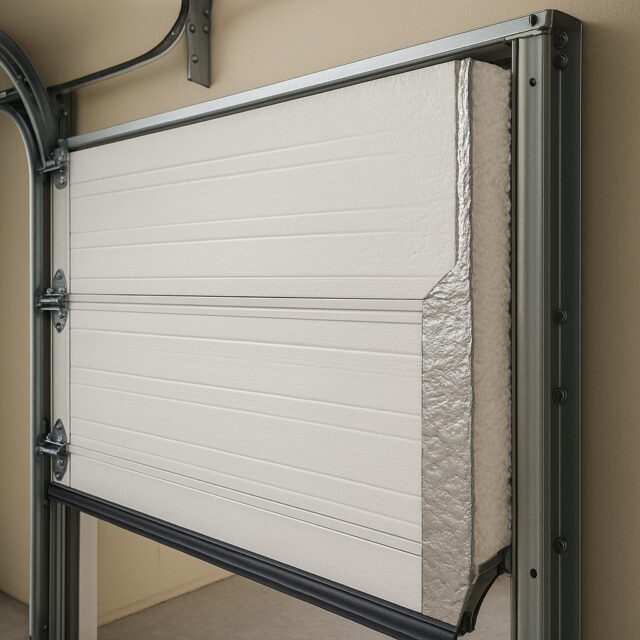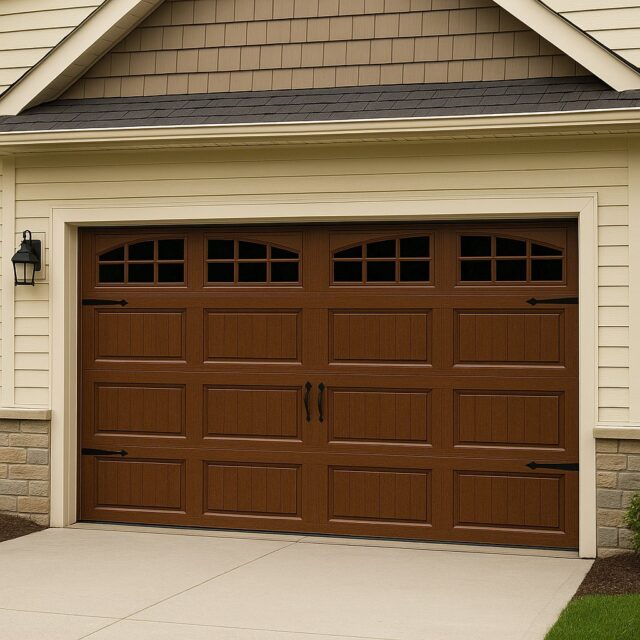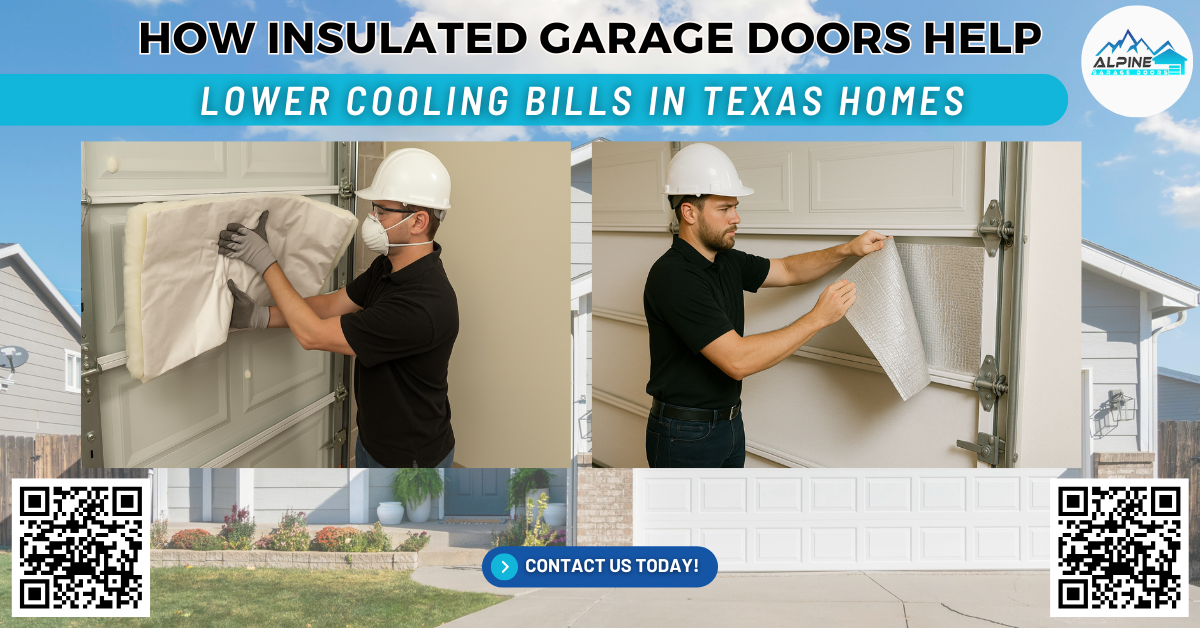It was a scorching summer afternoon in Atascocita when the Johnson family called us with a common Texas problem. Unbearably high energy bills and a garage that felt like an oven. Their home, like many in the area, had non-insulated garage doors made of thin aluminum panels with no protection against thermal transfer. Their AC was working overtime to cool nearby rooms, but the garage space was acting like a heat funnel, pushing hot air straight into the house. We replaced their old single door with a new insulated garage door using polyurethane insulation and high R-value panels. Within one month, their cooling costs dropped by more than 25%.
According to the U.S. Department of Energy, nearly 50% of a household’s energy bill comes from heating and cooling. For Texas homeowners, especially in the Houston area, maintaining indoor comfort during long, hot summers means addressing every part of your home, including the garage. If your garage shares walls or ceilings with the rest of your home, the heat transfer from a non-insulated door could significantly raise your cooling costs.
In this guide, we’ll explore how insulated garage doors work, why they’re a smart investment, what materials and types are best for energy efficiency, and how you can choose the best door for your garage space. Whether you’re building a new home or looking to upgrade your existing garage door, this article is packed with practical insights, product options, and helpful tips to help you save money and keep your garage and home cooler year-round.
🧊 What Is an Insulated Garage Door?
An insulated garage door is a multi-layered door that uses insulation materials such as polyurethane, polystyrene, or fiberglass to increase thermal resistance and reduce heat transfer between the garage and the outside environment. These doors often feature steel or aluminum panels, a layer of rigid foam, and sometimes even a thermal barrier liner to further enhance performance.

Unlike standard non-insulated doors, which often have a hollow cavity that lets heat and cold easily pass through, insulated garage doors create a protective barrier against extreme temperature changes, especially during the summer and winter months. Many models, such as those from Clopay garage doors, Martin garage doors, or Amarr garage doors, come in sectional door formats with high R-values, meaning greater resistance to heat flow.
Some common insulation types include:
- Polystyrene: Lightweight and affordable, often used in door insulation kits, but offers lower R-values.
- Polyurethane: Denser foam that expands to fill gaps, offering higher R-values, better noise reduction, and improved structural integrity.
- Fiberglass: A less common material, but excellent at resisting heat and noise.
🏡 Why Your Garage Matters for Cooling Your Home
Most homeowners don’t realize how much their garage affects their indoor temperature. If your garage shares walls with your living space, or if it has rooms above it, the heat from an uninsulated garage can penetrate walls and ceilings, causing your HVAC system to run longer and harder.
Here’s why:
- Thermal transfer from your garage raises indoor temps, especially in adjacent bedrooms or hallways.
- Uninsulated garages often trap heat, making your garage door opener, logic board, and garage equipment vulnerable to overheating.
- Garages are often used for more than parking your car; they double as gyms, workshops, or laundry rooms, which need temperature control.
If your garage door lacks thick insulation, you’re not just losing comfort, you’re losing money every month on your energy bills. That’s where insulated garage doors come in.
🌞 Benefits of Insulated Garage Doors in Texas
1. Significant Reduction in Energy Bills
The biggest draw of insulated garage doors is lower energy costs. These doors prevent hot outdoor air from transferring into your garage, reducing the amount of work your air conditioner has to do. This increases your home’s overall energy efficiency and provides real energy savings over time. With the proper R-value, you can cut monthly bills by 15%–25%.
2. Increased Indoor Comfort
Temperature regulation is critical in Texas homes. Insulated garage doors act like a thermal barrier, keeping adjacent rooms cooler in summer and warmer in winter. Homes with attached garages especially benefit from this added comfort, especially if insulation extends to walls and ceilings.
3. Improved Durability and Strength
Doors with polyurethane or polystyrene insulation are sturdier and more impact-resistant. Many steel insulated doors are also dent-resistant and better suited to withstand Texas’ unpredictable weather conditions. These doors last longer and are less prone to warping, rusting, or damaging under stress.
4. Noise Reduction
If your garage is near bedrooms or a living room, noise reduction is a bonus. Insulated garage doors dampen outside noise from cars, neighbors, and busy streets. With thicker insulation material, you’ll enjoy a quieter home, day and night.
5. Protects Belongings and Garage Equipment
Hot garages can damage sensitive electronics, paint supplies, tools, and even the logic board in your garage door opener. Keeping the garage at a stable temperature with insulation helps preserve your garage door products, garage door opener, and anything else stored inside.
6. Higher Resale Value
Today’s buyers are looking for energy-efficient homes with smart upgrades. A new insulated garage door increases your property’s curb appeal and resale value. Brands like Chamberlain garage door and Craftsman garage door offer premium models with excellent thermal insulation and aesthetic appeal.

🧰 Can I Insulate My Existing Garage Door?
You can, but it depends on your current door type and condition. Many DIY homeowners try to use garage door insulation kits, which contain batt insulation, Styrofoam panels, or rigid foam boards. While these may slightly improve performance, they often don’t provide the same R-values or structural benefits as a factory-insulated door.
If your existing garage door is old, damaged, or poorly sealed, the initial cost of a full garage door replacement might offer a better return on investment in the long run. For those seeking a step-by-step guide, our team at Alpine Garage Doors Texas is happy to walk you through all your insulation options.
🔍 Comparing Insulated Garage Door Materials
| Material | Insulation Type | R-Value | Pros | Cons |
| Steel | Polyurethane or Polystyrene | High | Strong, durable, good insulation | Heavier, may rust |
| Aluminum | Polystyrene | Medium | Lightweight, rust-resistant | Dents easily, lower insulation |
| Fiberglass | Polystyrene/Fiberglass | Medium | Moisture-resistant, quiet | Less durable, costlier |
| Wood Composite | Polystyrene | Medium | Aesthetic appeal | Requires maintenance |
Each garage door material offers unique benefits based on your budget, climate, and aesthetic preferences. Steel doors with polyurethane insulation typically offer the highest energy efficiency and R-values.
🏘️ Ideal for Texas Climate: Heat, Humidity, and Hurricanes
Texas weather can be unpredictable hot summers, occasional winter chills, and seasonal storms. An insulated garage door:
- Keeps your garage cooler in summer and warmer in winter.
- Reduces condensation and humidity, protecting your garage’s light sockets, openers, and stored goods.
- Offers additional wind resistance, ideal for coastal or storm-prone areas.
With proper weather seals, thick foam insulation, and high-performance garage door panels, insulated doors act as a shield against both heat and humidity.
💲 How Much Will You Save?
While the initial cost of an insulated garage door may be higher, the long-term savings on energy bills, reduced wear on your HVAC system, and lower maintenance costs make it a worthwhile investment. On average, Texas homeowners report saving between $150–$400 annually on cooling expenses alone.
You’ll also gain peace of mind knowing your garage door is built to last and helps your home run more efficiently for years to come.
📞 How Can Alpine Garage Doors Texas Help You?
At Alpine Garage Doors Texas, we’ve helped hundreds of homeowners across Atascocita, Houston, and neighboring communities upgrade their homes with energy-efficient insulated garage doors. Our team of trained technicians understands the importance of energy savings, comfort, and garage door durability.
We provide:
✅ Free consultations and on-site evaluations
✅ A wide range of door types, insulation materials, and product options
✅ Installation of high-performance insulated garage doors
✅ Garage door opener upgrades and weatherproofing
✅ Long-lasting door maintenance for maximum energy efficiency
Stop paying high energy bills and sweating through summer. Let us install the perfect insulated garage door for your Texas home.
📍 Address: 638 Saddle Rock Dr, Houston, TX 77037
📞 Phone: (346) 438-1138
👉 Call Alpine Garage Doors Texas today and schedule your free consultation!
Let’s keep your garage cool, your home efficient, and your bills low, the way they should be.
Alpine Garage Doors Texas – Expert care for your garage door, from insulation to installation and everything in between.
Frequently Asked Questions (FAQs)
1. Can insulated garage doors help reduce noise inside my home as well as outside?
Yes, insulated garage doors can significantly reduce both outdoor noise entering your garage and noise from garage door operation transferring into your home.
2. Do I need a specific garage door opener for an insulated garage door?
Not necessarily, but because insulated doors are often heavier, it’s best to use a strong, compatible opener, preferably a belt-drive or chain-drive with sufficient horsepower.
3. How long does it take to install an insulated garage door?
Most professional installations can be completed within 4 to 6 hours, depending on door size, opener compatibility, and any structural adjustments needed.
4. Is there a warranty on insulated garage doors?
Yes, most insulated garage doors come with manufacturer warranties ranging from 5 to 15 years, depending on the brand and material used.

